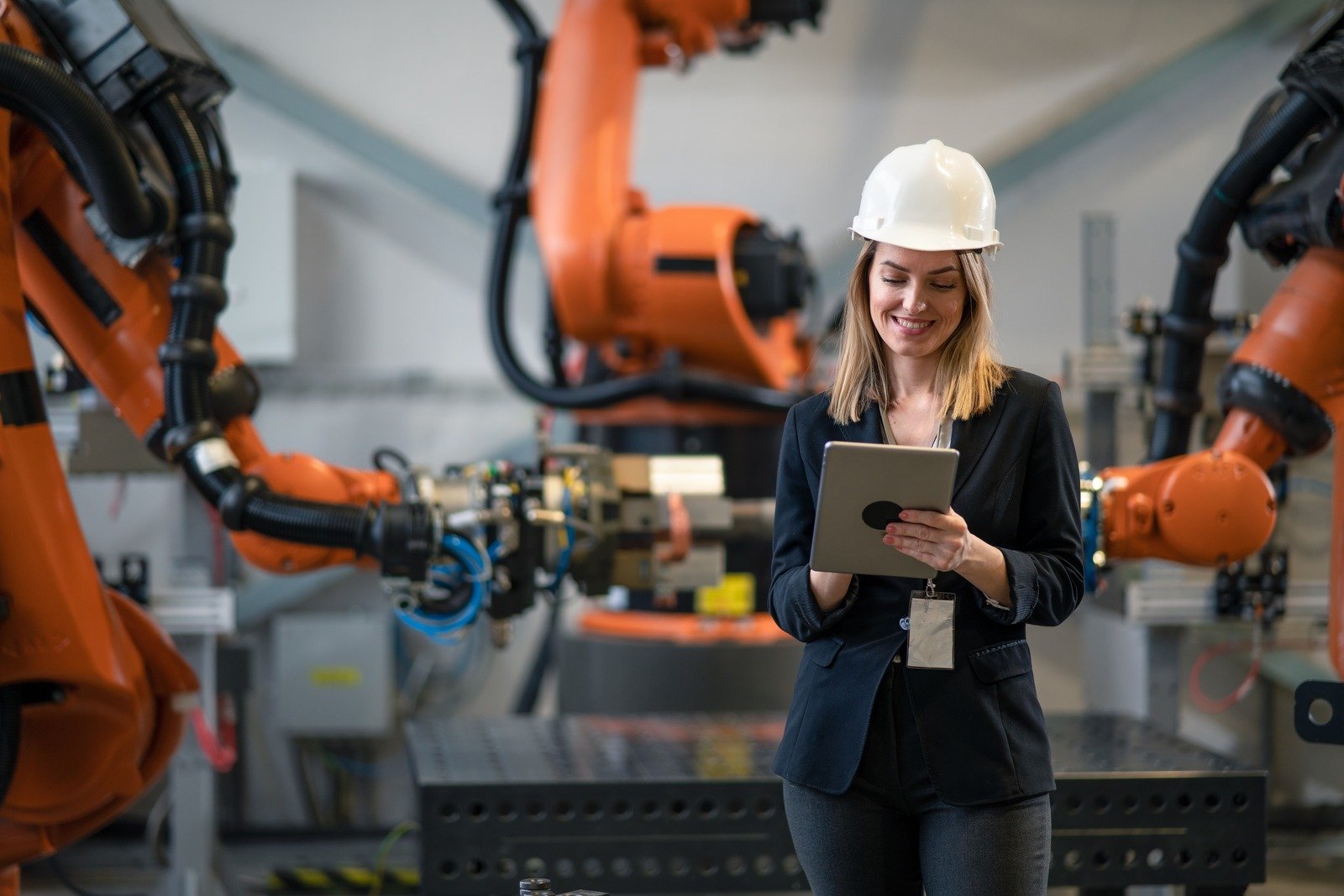
8 Top Benefits of Manufacturing Automation
Manufacturing has entered a new age of automation, with emerging technologies like artificial intelligence, collaborative robotics, and the Industrial Internet of Things (IIoT) transforming production across industries. Analysts predict the global industrial automation solutions market will reach $178.10 billion this year.1 As more manufacturers embrace automation, these innovations offer new potential to boost efficiency, quality, flexibility, and more across factory floors and beyond.
In this blog, we'll explain the benefits of using automation tools in manufacturing and how manufacturing leaders are using automation so you can leverage these innovative technologies effectively.
What Is Manufacturing Automation?
Manufacturing automation refers to using technologies such as robotics, sensors, artificial intelligence, and computer-controlled equipment to automate manual production processes and operations. These tools perform dangerous or repetitive tasks with precision, speed, and consistency unmatched by the human workforce.
Automation streamlines the manufacturing process by reducing errors and bottlenecks. Automated systems and industrial robots can work around the clock, freeing up employees for higher-value responsibilities that require human interaction. Ultimately, manufacturing automation aims to increase an organization's production capacity while reducing costs.

Types of Automation in Manufacturing
There are several types of automation used in the manufacturing sector. While not every automation type is right for every manufacturing business, many can benefit from one or more of the following:
Fixed Automation
Fixed automation, sometimes called hard automation, is when specialized equipment is designed to perform a specific task, such as repetitive actions on a production line. Fixed automation systems excel at high-volume, low-variety manufacturing processes, and the equipment can operate until reconfigured or replaced.
Programmable Automation
Programmable automation uses programmable logic controllers (PLCs) to produce batch quantities of product in a short amount of time. The equipment must be reconfigured to accommodate each new product style, which may result in downtime.
Flexible Automation
Flexible automation uses computer numerical control (CNC) machines and robots that can be reconfigured via software instead of mechanical changes. While these tools can perform different functions, they only work with a limited style of products. Manufacturers can leverage flexible automation to combine several processes to increase efficiency with less downtime.
Integrated Automation
Integrated automation incorporates multiple automated systems into the entire manufacturing process. This automation type offers comprehensive monitoring and more control over manufacturing materials, handling, and more.
What Industries Use Manufacturing Automation?
Manufacturing automation has applications across many industries. A few examples include:
Automotive
The automotive industry relies heavily on automatic assembly machines, conveyors, and vision systems for production lines, painting, welding, and quality control. These automation tools can improve worker safety and reduce human error in production processes that require precision.
Aerospace
Aerospace manufacturers use precision automation solutions, such as automated drilling and riveting, to help them meet the rigorous demands of the aerospace industry for components that feature extremely tight tolerances.
Electronics
As electronic devices and components continue getting smaller and more complex, automation is increasingly critical for electronics manufacturers. Automating the assembly of intricate electronics improves precision and quality control.
Food and Beverage
Automating traditionally manual processes like filling, capping, labeling, and packaging increases safety, sanitation, and output volumes in food and beverage facilities. Strict hygiene and consistency requirements also make food and beverage production lines prime candidates for automation.
Medical Devices
Automating the production of medical devices improves quality assurance and enables reliable mass production of intricate, life-critical medical products.
Consumer Goods
Popular consumer goods like household cleaners, cosmetics, and consumables use automation to mix, fill, pack, and palletize finished products. The speed, efficiency, and flexibility of automated processes are essential for meeting high volumes and rapid changeovers.
Oil and Gas
Hazardous oil and gas environments are leading adopters of automation to remove human workers from danger. Automated drilling, welding, and refining processes boost safety and output volumes in this global industry.
Logistics
Automated picking, packing, and shipping systems are transforming modern warehouses and distribution centers by providing more accuracy, speed, and savings at every step of the supply chain -- from production to delivery.

What Are the Benefits of Automation in Manufacturing?
Automating manufacturing tasks offers businesses several key benefits, including:
1. Increased Efficiency
Automation tools perform tasks faster and without breaks, fatigue, or errors. These tools can operate around the clock to maximize production capacity and efficiency. With automation, manufacturers can increase their overall equipment effectiveness and avoid costly downtime, directly translating to higher throughput and output volumes.
2. Quality and Consistency
Automation technology minimizes defects and produces consistent, high-quality goods according to exact programmed specifications. Automated processes perform repetitive, tedious tasks the same way each time, and quality control automation provides objective, comprehensive coverage that humans can't match.
3. Flexibility and Scalability
With programmable automation, manufacturers can quickly scale output up or down and introduce new products to align with demand shifts. This agility allows faster responses to evolving customer demands and market conditions.
4. Reduced Labor Costs
With 616,000 manufacturing job openings as of August 2023,2 more organizations are depending on automation tools to fill the gap. Automating manual tasks reduces labor requirements and associated wage expenses. However, automation also creates new jobs to supervise automated processes. The remaining workers can focus on other responsibilities that leverage human judgment, creativity, and problem-solving abilities.
5. Safer Work Environment
Automating hazardous tasks mitigates health and safety risks to human employees, who no longer need to interact directly with dangerous equipment or materials. This improves working conditions, protects employees from harm, and eliminates exposure to dangerous and dull work that still plagues many manufacturing facilities worldwide.
6. Greater Sustainability
Manufacturing process automation improves energy efficiency and material savings as compared to manual production by optimizing resource consumption and minimizing waste. This increased sustainability ultimately benefits the environment as well as the manufacturer with tangible cost reductions.
7. Real-Time Data and Analysis
Smart manufacturing solutions generate valuable real-time production data. Advanced analysis of this data uncovers optimization opportunities while better informing data-driven decision-making. The volumes of data and analytics potential keep growing exponentially as automation and IIoT networks expand.
8. Predictive Capabilities
The advanced analytics and machine learning (ML) algorithms applied to operational data from automated systems help predict potential equipment failures. This predictive maintenance capability enables IT teams to address issues proactively before causing unplanned downtime, preventing major revenue and productivity losses.

Popular Trends in Manufacturing Automation
Several emerging trends are shaping the future of automation in manufacturing, such as:
Artificial Intelligence
AI algorithms can draw actionable insights from data sets to improve performance, predictive maintenance, and more, enabling more intuitive automation that can adapt to new situations.
Industrial Internet of Things
Networked, smart automation systems share data and instructions in real-time for increased productivity and visibility across the entire supply chain. The incredible volume of data produced by IIoT creates immense analytics potential.
Advanced Robotics
Industrial robots now feature expanded dexterity, mobility, and intelligence to take on more tasks, both on and off the production line. Advancements in computer vision, sensors, grippers, and movement enable robots to take on more human capabilities.
Additive Manufacturing
Additive manufacturing, or 3D printing, offers on-demand, decentralized production capabilities that enhance flexibility. 3D printing is particularly promising for simplified, low-volume production of complex, customized parts.
Human-Machine Collaboration
Rather than full automation, many manufacturers are implementing collaborative robots that safely work alongside humans to combine manufacturing automation with human skills.
Simulation and Digital Twin Modelling
Simulating manufacturing processes prior to implementation predicts bottlenecks, waste issues, and other problems. Digital twin technology mirrors the physical factory to assess future changes digitally before enacting them physically, ensuring smooth automation adoption.
Leverage Marketing Automation Effectively With Andromeda
When implemented correctly, automating all or even just part of your manufacturing operation doesn't just increase output volumes – it improves product quality, data insights, and more to drive productivity gains across your entire business. However, integrating next-gen automation technologies into existing infrastructure can be challenging for manufacturers that lack specialized knowledge. Implementing the wrong automation solutions or failing to ensure your IT infrastructure can support new solutions may create risks such as project delays, cost overruns, and disruption to your operations.
Working with a reliable technology partner like Andromeda can ensure you have the expertise and support to leverage new technologies with confidence. We specialize in serving manufacturing companies in the Midwest with proactive IT and building security solutions, and we've helped over 2,500 clients stay secure and connected in our 28-year history. Ready to leverage manufacturing automation tools effectively? Reach out to the Andromeda team today to get started.
Sources:
Keep Your Business Safe, Secure, and Running
We’ll take a proactive approach to your manufacturing IT – and help your business blast off.




